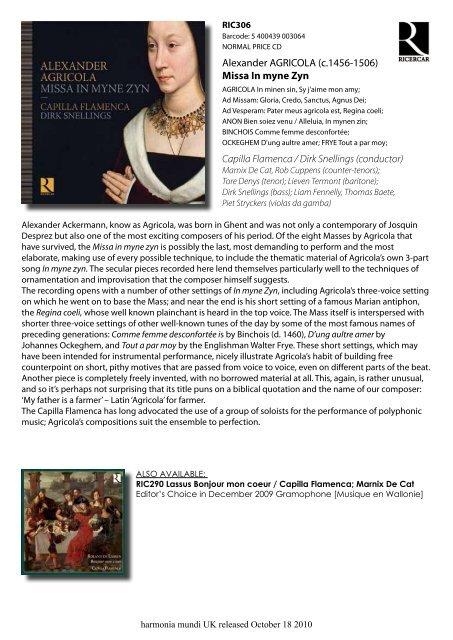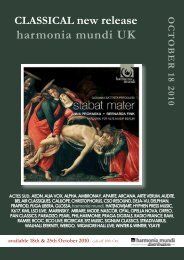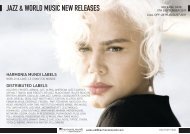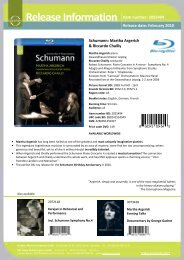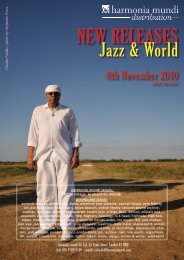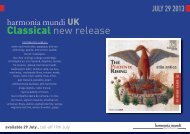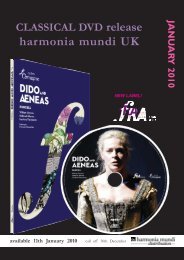Download - Harmonia Mundi UK Distribution
Download - Harmonia Mundi UK Distribution
Download - Harmonia Mundi UK Distribution
You also want an ePaper? Increase the reach of your titles
YUMPU automatically turns print PDFs into web optimized ePapers that Google loves.
RIC306<br />
Barcode: 5 400439 003064<br />
NORMAL PRICE CD<br />
Alexander AGRICOLA (c.1456-1506)<br />
Missa In myne Zyn<br />
AGRICOLA In minen sin, Sy j'aime mon amy;<br />
Ad Missam: Gloria, Credo, Sanctus, Agnus Dei;<br />
Ad Vesperam: Pater meus agricola est, Regina coeli;<br />
ANON Bien soiez venu / Alleluia, In mynen zin;<br />
BINCHOIS Comme femme desconfortée;<br />
OCKEGHEM D'ung aultre amer; FRYE Tout a par moy;<br />
Capilla Flamenca / Dirk Snellings (conductor)<br />
Marnix De Cat, Rob Cuppens (counter-tenors);<br />
Tore Denys (tenor); Lieven Termont (baritone);<br />
Dirk Snellings (bass); Liam Fennelly, Thomas Baete,<br />
Piet Stryckers (violas da gamba)<br />
Alexander Ackermann, know as Agricola, was born in Ghent and was not only a contemporary of Josquin<br />
Desprez but also one of the most exciting composers of his period. Of the eight Masses by Agricola that<br />
have survived, the Missa in myne zyn is possibly the last, most demanding to perform and the most<br />
elaborate, making use of every possible technique, to include the thematic material of Agricola’s own 3-part<br />
song In myne zyn. The secular pieces recorded here lend themselves particularly well to the techniques of<br />
ornamentation and improvisation that the composer himself suggests.<br />
The recording opens with a number of other settings of In myne Zyn, including Agricola’s three-voice setting<br />
on which he went on to base the Mass; and near the end is his short setting of a famous Marian antiphon,<br />
the Regina coeli, whose well known plainchant is heard in the top voice. The Mass itself is interspersed with<br />
shorter three-voice settings of other well-known tunes of the day by some of the most famous names of<br />
preceding generations: Comme femme desconfortée is by Binchois (d. 1460), D’ung aultre amer by<br />
Johannes Ockeghem, and Tout a par moy by the Englishman Walter Frye. These short settings, which may<br />
have been intended for instrumental performance, nicely illustrate Agricola’s habit of building free<br />
counterpoint on short, pithy motives that are passed from voice to voice, even on different parts of the beat.<br />
Another piece is completely freely invented, with no borrowed material at all. This, again, is rather unusual,<br />
and so it’s perhaps not surprising that its title puns on a biblical quotation and the name of our composer:<br />
‘My father is a farmer’ – Latin ‘Agricola’ for farmer.<br />
The Capilla Flamenca has long advocated the use of a group of soloists for the performance of polyphonic<br />
music; Agricola’s compositions suit the ensemble to perfection.<br />
ALSO AVAILABLE:<br />
riC290 lassus bonjour mon coeur / Capilla flamenca; marnix De Cat<br />
Editor’s Choice in December 2009 Gramophone [Musique en Wallonie]<br />
harmonia mundi <strong>UK</strong> released October 18 2010


